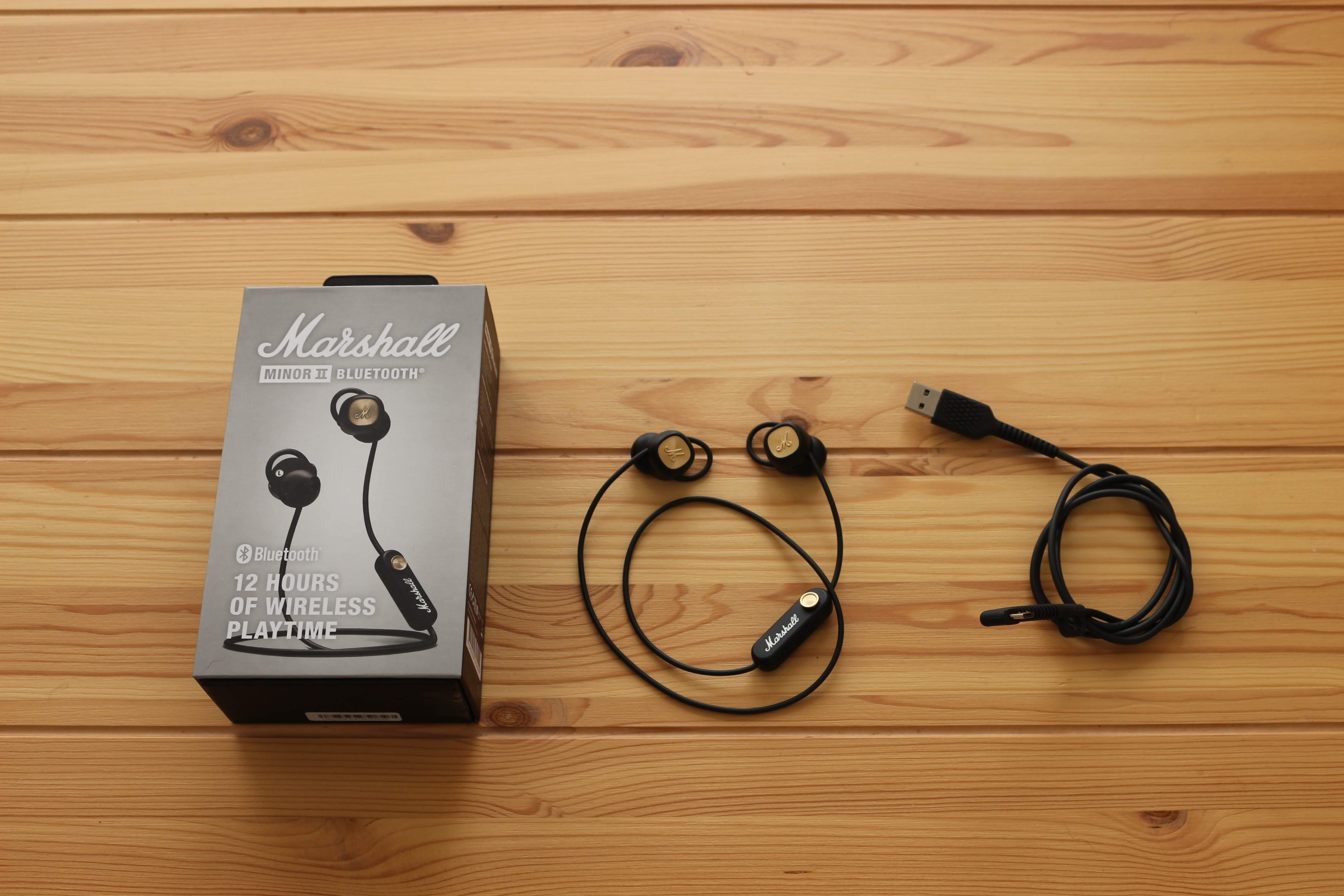
The Marshall Minor II Bluetooth Headphones are an everyday way to feel that connection to a brand that’s become synonymous with professional sound—and rock and roll culture. At least, it feels as though that’s what Marshall has tried to do with the Minor IIs. Whether they’ve properly executed on that depends a lot on the shape of your ears. I had a chance to test these headphones out and here’s what I found.
Marshall Minor II In-Ear Bluetooth Headphone Review
The Minor IIs are an update to the original Marshall Minor in-ear headphones that were released 8 long years ago and these new versions offer improvements in line with how the industry and technology has progressed since then. They come in brown and black, and in this review, I’ll give you my take on the quality of the design, fit, performance, and value you get with the black Marshall Minor II In-Ear Bluetooth Headphones.
What’s in the box?
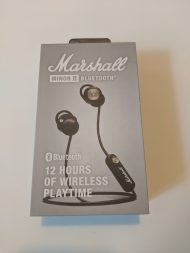
Unlike some of the other headphones in Marshall’s lineup that come with cases and other accessories, the Minor IIs only ship with a standard micro USB charging cable in addition to the headphones themselves. Apart from the manual, there isn’t anything else in the box. The lack of a carrying case may be a nod to one of the headline features of these buds though; the magnetic pause function, which I’ll get into a bit later.
Design of Marshall Minor II Bluetooth Headphones
These headphones actually look pretty great, with the gold accents on the earbuds and a multi-directional control knob. The stylized “M” on each earbud is actually made of metal and grabs the eye when seen in your ear. The battery, microphone, controls, and the brain of these headphones are all contained within the in-line remote that features Marshall’s timeless logo embossed in stark white contrast.
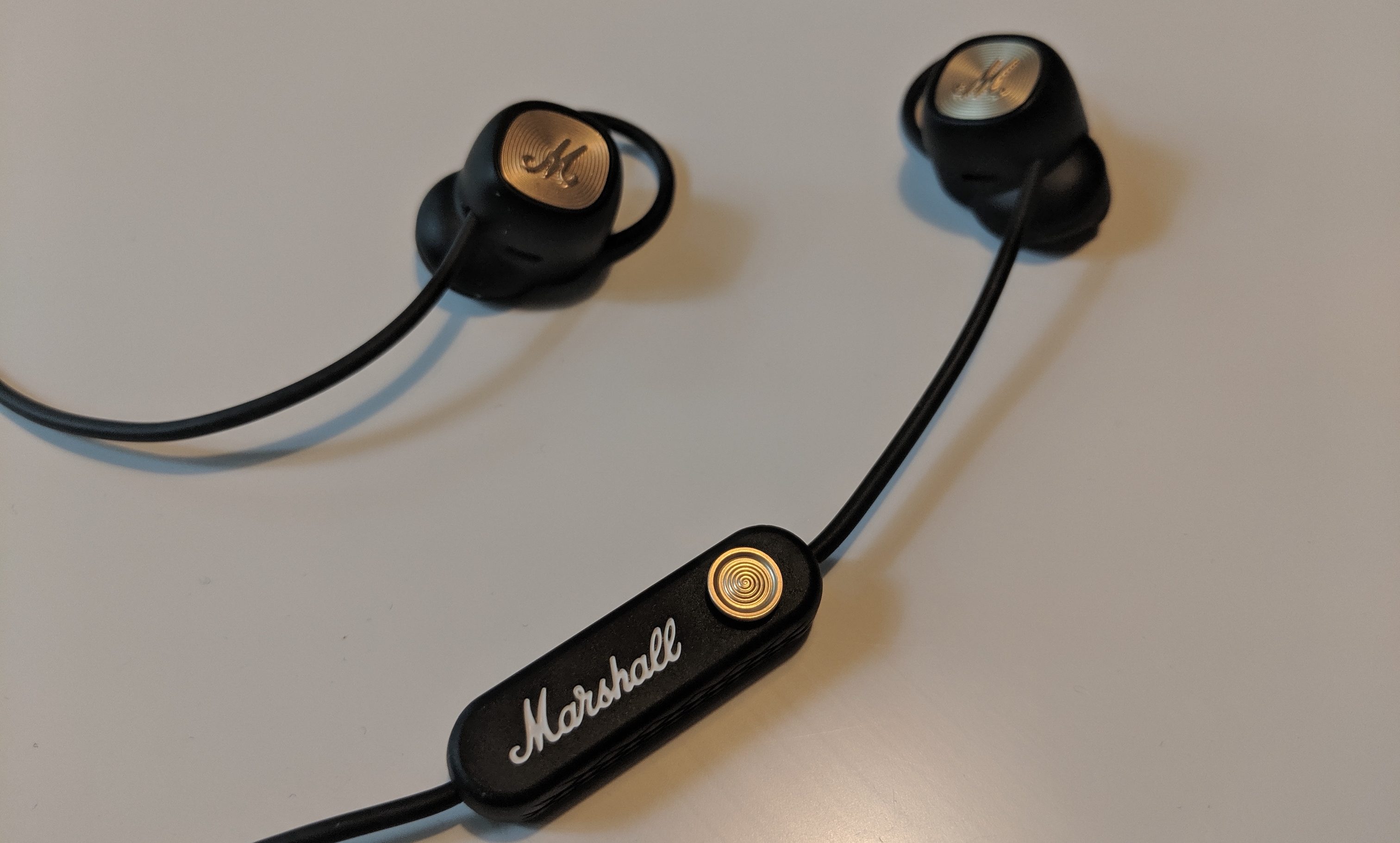
The Control Knob
To control your music and phone calls wirelessly Marshall has devised the ‘multi-directional control knob’ (the raised circle you can see on the inline remote) which has ten different types of uses that you better hope you remember when the time comes:
- On/Off – Push and hold for 3 seconds.
- Play/pause – single click.
- Skip forward – push to the right.
- Skip backward – push to the left.
- Fast forward – push to the right and hold.
- Rewind – push to the left and hold.
- Turn up the volume – Push upward.
- Turn down the volume – Push downward.
- Handle calls:
– Single click to answer/end a call
– Double click to reject a call - Activate your assistant (Google/Siri, etc) – Double-click.
The control knob actually works reasonably well and is a pretty nifty way to pack a lot of functionality into a single mechanism. No more wondering if your finger is on the power or the volume button before you press. The only challenge is remembering which way is up/down/left/right, and that gets easier pretty quickly. The process is made a little easier because the whole assembly hangs downward while you’re wearing the headphones, but there are some definite ‘which way is up?’ moments the first few times you go to use it.
Marshall Minor II: Magnetic Pause Feature
The Marshall Minor II Bluetooth Headphones feature a magnetic pause feature. By clipping the two earbuds together, you pause the music and create a closed loop around your neck.
This magnetic pause is pretty handy for two reasons. For one, it’s a quick way to make sure you’ve paused your music if you have to take out your earbuds. Secondly, it’s really helpful when you want to store your headphones for a short time since it basically turns them into a necklace that will stay in place as you move around. This may have been the main reason there’s no carrying case included with the headphones as well. They’re meant to be worn in full view.
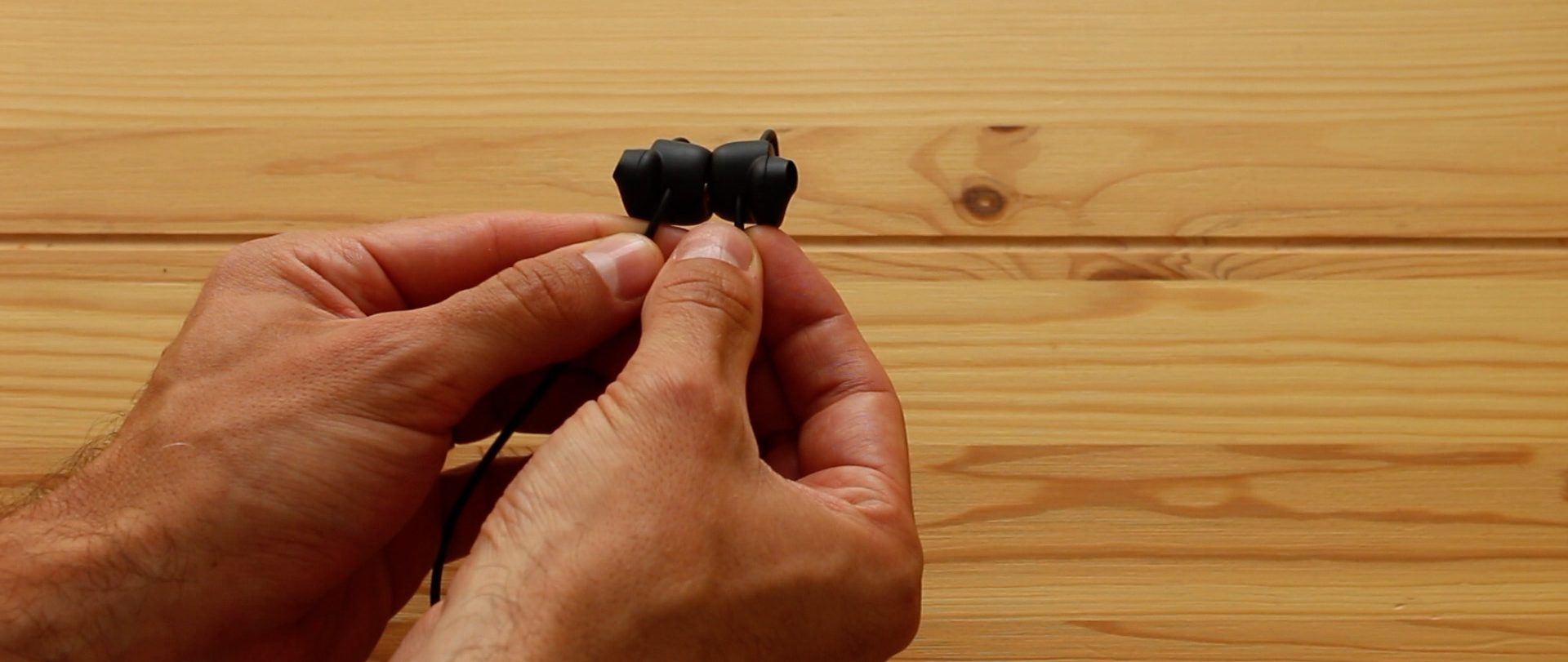
In a world quickly being dominated by true wireless earbuds, the Minor IIs opt to stick with a connecting cord between the earbuds. This is perhaps helpful for people who might misplace separate earbuds, and also results in much longer battery life thanks to the in-line battery/remote. The downside of this wired design and larger remote is that it tends to get caught up one one side or the other of your neck as you move. I was a bit used to this from other similarly designed headphones, but the size of the remote on the Marshall Minor IIs made the effect much worse.
Fit & comfort: Marshall Minor II Headphones
Marshall has used with what they’re calling an “innovative ear-fit system” on the Minor IIs, which may have been made slightly less innovative when Google’s Pixel Buds launched a couple years ago with the same basic design. The whole idea is to loop the cord connecting both earbuds together up, around, and through each earbud to create a loop of cable that helps hold it in your ear. You can adjust it yourself to achieve a good fit. This works reasonably well and offers the benefit of being able to have each earbuds’ fit customized to each one of your ears. I found that my left ear needed less of a loop compared to my right ear. The loops do help keep the earbuds in place quite well, but doesn’t keep them as nestled in my ears as they should be to get the best sound out of them.
Rigid rubber is uncomfortable
The earpieces that actually fit into your ear are by far my least favourite part of the design of these headphones. They’re described as being rubber, but it’s so rigid that it might as well be hard plastic. In fact, there is a hard plastic edge that digs into my left ear when I wear these. I’ll point to it in the picture below.
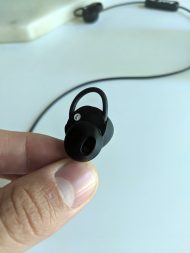
It seems as though two different design teams just mashed their creations together and called it done. It’s worth noting that I’m someone who prefers the sound-isolating rubber in-ear style earbuds that ship with many different headphones these days. I find that they do a better job of making the right kind of seal and positioning needed to get the sound to my ears so I can experience the full range being put out by the drivers. With these (and any other headphones that rest outside the ear canal), I’ve found that I just can’t ever hear what’s actually being produced unless I press the headphones firmly into my ears and hold them there. Obviously this is a dealbreaker for me, but I imagine that in the ears of others, this design might work well.
Sound quality: Marshall Minor II Bluetooth Headphones
As I mentioned above, the sound quality is going to depend on the shape of your ears. Without a good fit these headphones are simply not going to allow you to hear what is actually a pretty amazing sound profile.
To try and simulate a good fit, I pressed the earbuds into my ears firmly and was impressed with the richness of the sound and the details I could hear at both the lower and higher frequency ranges. The bass was deep and full, but not overpowering and thumpy. I was actually really impressed with the quality and the nuance of the bass. The treble range came through crisp and bright, and never sounded tinny or screechy. I would put the audio quality up there with some of the best earbud headphones that I’ve tried… it’s just that I had to constantly press them into my ears to hear it.
One fun thing worth mentioning are the electric guitar riffs that signal when the headphones turn on and off. They’re a nice reminder that you’re listening to headphones that are built to showcase the raw sound of a well-player guitar.
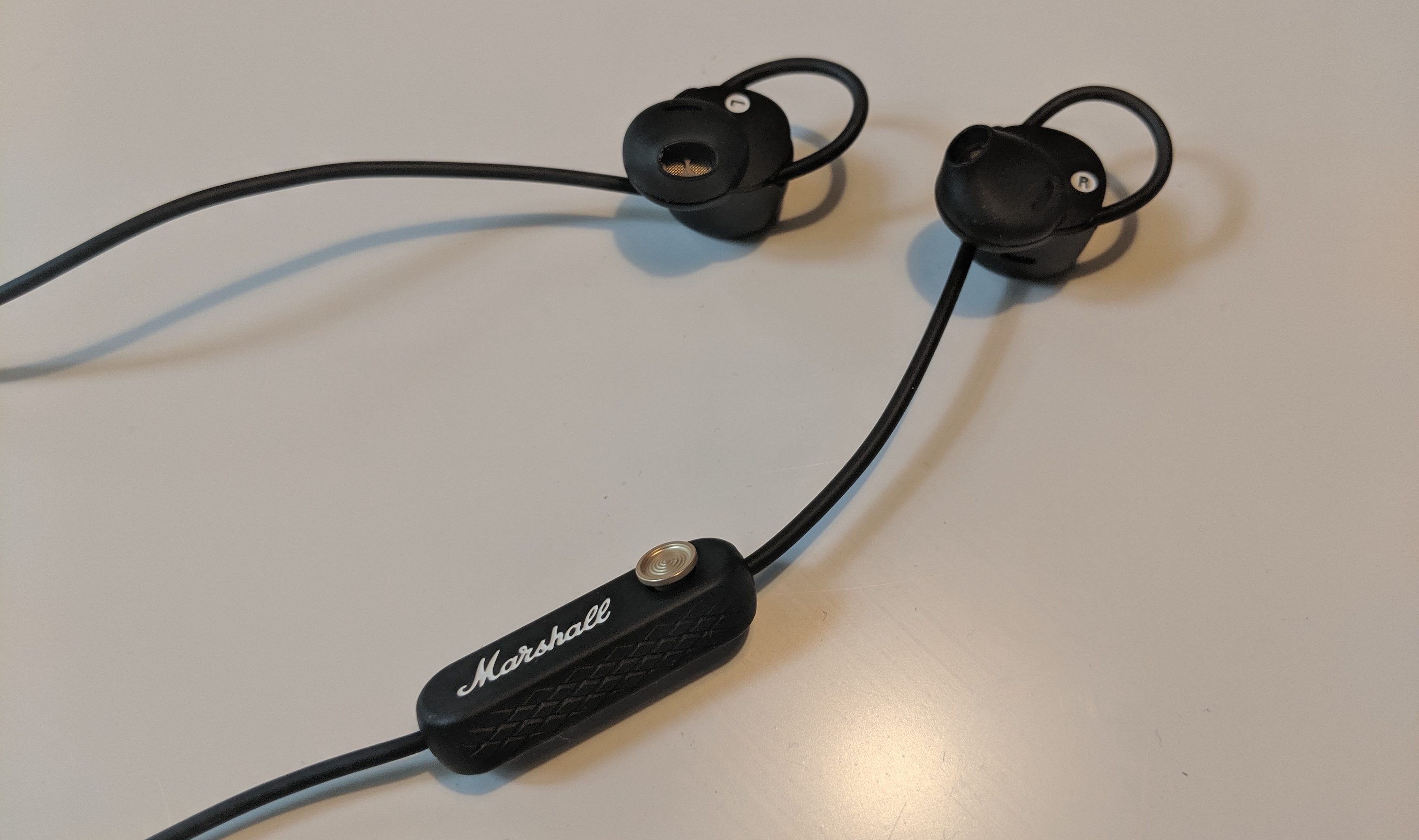
The Battery
The battery on the Marshall Minor II headphones is reported to last 12 hours at medium volume, and in my testing I’ve found that to be nearly true (getting about 10 hours). I had mine turned up a little louder than medium though due to the fit, so I’m assuming that was the main factor in the difference. 10 to 12 hours is still a pretty serious run for a pair of small wireless Bluetooth headphones, and is likely due the decent-sized remote built in-line between the earbuds that contains the battery. The battery takes 2 hours to charge fully via micro USB, but with the fast charging feature, the first 20 minutes will give you 2 hours of listening time. That’s pretty helpful when you’re about to go for a workout, walk, or just out of the house for a while.
Are Marshall Minor II Bluetooth Headphones good for running?
These headphones are not made for running. You could certainly use them for that, but they aren’t IPX rated, which means they aren’t designed to prevent dust or moisture from getting inside. The large remote gives you longer battery life, but it also bounces around and causes the wire to get hung up on your neck all the time. Running is however the time when you might appreciate the lack of sound isolation since that allows you to hear sounds around you while running; something that’s a bit safer if you’re running at night or in an urban environment.
A couple other positives for runners are that the microphone performs pretty well in wind and the ear fit system does prevent you from having to readjust the headphones in your ears all the time. Personally I wouldn’t recommend these for running though; especially longer runs, since over time your sweat could damage the headphones, and the sound quality due to the fit isn’t the best.

Final thoughts on the Marshall Minor II
Personally, these headphones aren’t for me since my preference is for in-ear headphones that offer a better seal with some softer rubber tips. This really helps to isolate external noise and deliver the sound I want to hear right to my ears, and the Marshall Minor II headphones simply aren’t those kind of headphones. That doesn’t mean though that they won’t be great for others. The quality of the sound is there, and the control knob is a pretty handy way to get a lot of functionality out of a simple design. The battery life is great for small form-factor Bluetooth headphones, and there is definitely a feeling that you’re listening to music through a device that bears the heritage and distinction of a brand so embedded in the biz as Marshall.
If you’d like to learn more, check out the video and the Marshall Minor II Bluetooth Headphones on bestbuy.ca.


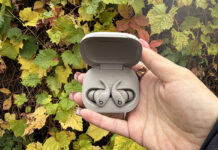
I’ve always known Marshall to make quality amps, but in these recent reviews I’m learning about how they also make other quality audio devices. I currently have a cheap pair of bluetooth in-ear headphones that only last for about 4 hours and take 1.5 hours to charge. These sound perfect for going around the city on walks, and the price isn’t too bad either. I’m definitely interested in picking these up.
Thanks.
Thanks for your comment, Ian! It’s helpful to know the reviews provide useful info. If you have any other questions feel free to ask.
Comments are closed.